Dishonored is a first-person stealth action game that smells sweetly of Thief and Bioshock. Beneath the sinister cloak-and-dagger gameplay and masterfully realized setting, there lies a chaos system. It gauges your carnage, tallies your eviscerations, considers your subtlety, ponders your disposition toward revenge or mercy and changes the world accordingly. It also changes your daughter.
WARNING: POTENTIAL SPOILERS BELOW!
Dishonored never outright says whether Emily (voiced with vim by Chloë Grace Moretz) is your daughter, and I don’t feel that’s important in the scope of this or any daughter-relevant article. What is important is that you’re a father figure to her, that she looks to you for protection and guidance. So daughter or not, you’re wearing the daddy trousers.
Now, I’m not going to tackle the dichotomy between Dishonored’s high- and low-chaos endings; that’s enough content for another article entirely. Though I think it should be said that they aren’t easily separated into good and evil routes given the downright magnificent bastard approach to disposing of targets which lends to the low-chaos ending. They’re more a representation of the impact your choices have on Dunwall during its plight.
Playing a high-chaos route and witnessing the aftermath had no effect on me. I summarily slaughtered each and every guard or assassination target in my path. Choke holds were foreign beasts, repulsive beasts. I wouldn’t go out of my way to sow chaos: I favored the surreptitious approach. But if I found myself feeling particularly miffed or bloodthirsty, I would step out of the shadows with pandemonium alongside. Retribution felt marvelous.
Then I’d return from the mission to see Emily.
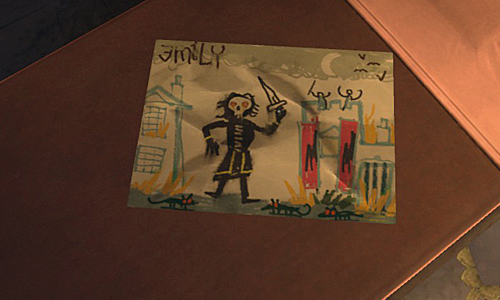
Maybe she’d speak something of how I’d killed people. Maybe she’d be drawing something you’d expect from a sorely canted child suffering horrible nightmares. Maybe she’d make some remark or ask a question that hinted at a sadistic, controlling side. Something like, “When I’m empress, I’m going to take two big ships, fill them with soldiers and make them crash into each other. Empresses can do that, right?” I didn’t really think anything of it. Her mother had been murdered in front of her six months earlier. It seemed par for the course.
Watching my wife play the low-chaos route was when the truth of matters was made salient: I had shaped Emily. In her game, the child was more carefree, less vindictive—normal, as it were. Her doodles were rainbow-festooned, her personality lightsome. One such doodle, which was left by Corvo’s bed, was of Corvo (the player-character) without his mask and labeled “Daddy”. This continued throughout the game in ways both tiny and large: from a mural of his face through her eyes near the end of the game to the nature of the final confrontation. I was effectively the difference between a girl soon to be empress who thought fear and power were ways to rule and one who valued compassion. She watched me and learned from how I handled my problems.
Witnessing those contrasting paths mostly simultaneously did a curious thing, something Arkane Studios should be lauded for: it made me regret my decisions. As a misanthropist and moral relativist, it spoke to me in ways the crumbling empire had not. There comes a point when your actions, however justified, are shaping a person’s life. And when that person is your daughter, well, the price is leagues higher.
I found myself rushing through the high-chaos route simply to finish it, to start a new game and effectively wipe clean all my wrongdoing. And more than the satisfaction of retribution imparted by my initial play through, it felt marvelous to see Emily trot about unburdened by my deeds. There’s something to be said about Dishonored, then, as it approaches fatherhood in video games. Bioshock 2 was often praised for this, but I’m certain I never felt anything that could be even peripherally painted as paternal.
Part of me appreciates the high-chaos ending more because, as Nabokov put it, “Harm is the norm. Doom should not jam.” Happy endings generally aren’t as impactful. Nonetheless, knowing I did Emily right in the low-chaos route was both redeeming and a pleasant relief. Dishonored is home to a great deal of applause-worthy residents. In that teeming population, Emily is empress. Fashioning an endearing character is always lovely. But I feel the apex of interactive entertainment is wielding the power of a player against them: to give their choices visible weight in a character’s development. Then, when they’ve reached a point where reflection is possible, they might look back as I did and think, “What the hell have I done?”
So when considering your actions, forget the city of Dunwall—impressive as it is, sprawling as it is, alive as it is. Look at Emily. She is so much more alive and so very tractable.
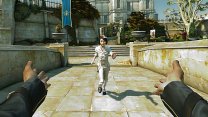
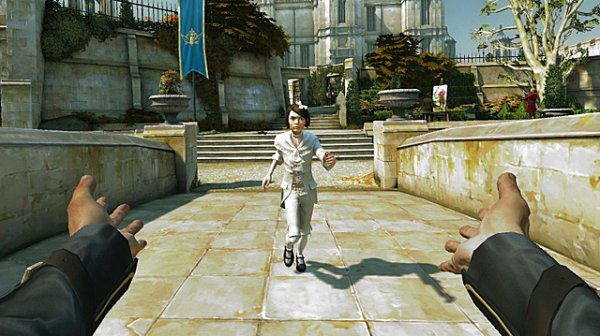
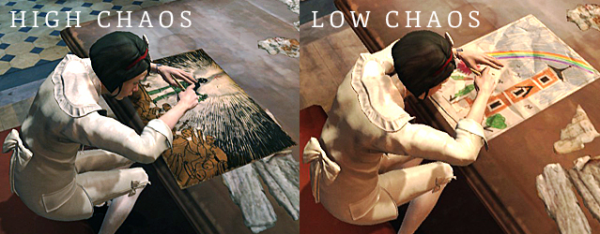
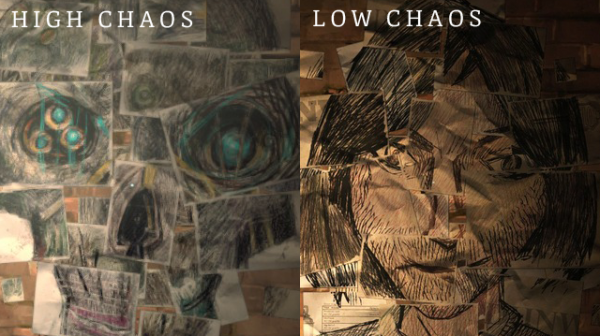
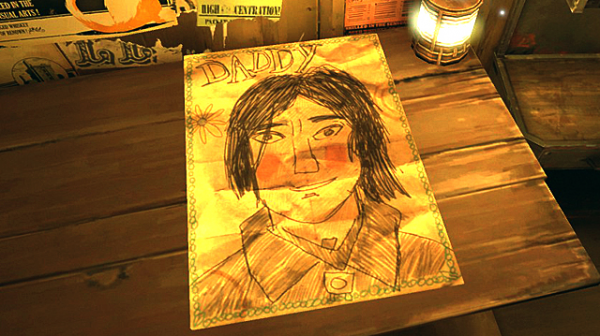
Bravo.
Thank you! V:
Beautifully stated.
Thank you! :V I turned the face around for you.
Huh. Never noticed this. I’m a massive pacifist so I avoided killing at all costs. I also wrote a review of Dishonored and I stated that it felt like Emily was only there to wring affection out of the player like most other video games did. In a way, I’m happy that this isn’t actually the case and things like this can actually happen.
Thanks for the article.
I began to reply by explaining what I did, only to realize I’d already covered that in the article. But yeah, your approach certainly changes her. It’s somewhat polarized and could have been done better, but that doesn’t mean it wasn’t done well in my book.